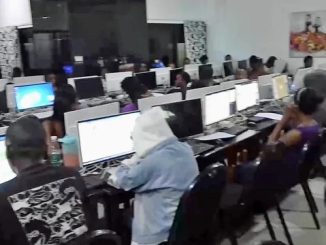
The first person to be charged under Hong Kong’s controversial national security law has been found guilty in a landmark ruling on Tuesday.
Tong Ying-kit was found guilty of inciting secession and terrorism after riding a motorbike into police officers and flying a flag calling for Hong Kong’s “liberation”.
More than 100 people have been arrested since the law came into force in 2019.
It reduces Hong Kong’s autonomy and makes it easier to punish activists.
Beijing insists that the widely criticised law, which came after a series of mass pro-democracy protests in 2019, is needed to bring stability to the city.
Tuesday’s verdict, which is the culmination of a 15-day trial, means Tong could face life in jail. His sentencing is due at a later date.
He was sentenced at a trial without jury – a departure from Hong Kong’s common law tradition. The defence team had argued for a jury but Hong Kong’s justice secretary argued that the jurors’ safety would be put at risk given the city’s sensitive political climate.
‘Liberate Hong Kong’
The 24-year-old was arrested in July last year, after he rammed his motorcycle into a group of police officers on the street. At the time he was carrying a black protest flag emblazoned with the phrase “liberate Hong Kong, revolution of our times”.
During the sentencing, Justice Toh said the phrase was capable of inciting others to commit secession, local outlet HKFP reported.
Justice Toh had added that Tong understood the slogan carried a secessionist meaning – implying the separation of Hong Kong from the Chinese mainland.
They also found his failure to stop at police check lines and his eventual crashing into officers – was a “deliberate challenge mounted against police”, local reports said.
“The defendant carried out those acts with a view to intimidating the public in order to pursue his political agenda,” Justice Toh was quoted as saying.
The BBC’s Grace Tsoi, who was at the court house when the verdict was delivered, said there were dozens of journalists and members of the public packed into the small courtroom.
There was “utter silence” when the verdict was read out to Tong, who appeared very calm and waved to supporters before being led out of the dock, our correspondent added.
The verdict sets the tone for how future cases under the law might be interpreted.
“The conviction of Tong Ying-kit is a significant and ominous moment for human rights in Hong Kong,” said Amnesty International’s Asia-Pacific Regional Director Yamini Mishra in a statement.
“Today’s verdict underlines the sobering fact that expressing certain political opinions in the city is now officially a crime, potentially punishable by life in jail.”
Why is the national security law controversial?
A former British colony, Hong Kong was handed back to China in 1997 but under the “one country, two systems” principle.
This was supposed to guarantee certain freedoms for the territory – including freedom of assembly and speech, an independent judiciary and some democratic rights – which mainland China does not have.
These freedoms are enshrined in Hong Kong’s mini-constitution, the Basic Law, which was meant to last until 2047.
But in June last year, Beijing passed the national security law – which lawyers and legal experts said would fundamentally change the territory’s legal system.
Under the law for example, trials can be held in secret (Article 41) and without a jury (Article 46). Judges can be handpicked (Article 44) by Hong Kong’s chief executive, who is answerable directly to Beijing.
Since it was enacted more than 100 people – including protesters, pro-democracy politicians and journalists – have been arrested under its provisions.
Source: bbc.co.uk






Be the first to comment